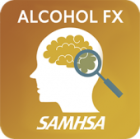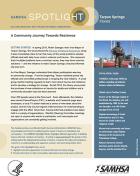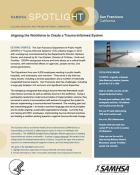This tip sheet describes feelings and thoughts you may have during and after social distancing, quarantine, and isolation. It also suggests ways to care for your behavioral health during these experiences and provides resources for more help. SOMALI Language Version.
Dashboard: Filter Bricks
Main page content

This fact sheet explains social distancing, quarantine, and isolation in the event of an infectious disease outbreak. It discusses feelings and thoughts that may arise during this time and suggests ways to cope and support oneself during such an experience.

Have You and Your Family Been Affected by a Disaster? Poster pertaining to youth and child reactions
Parents and caregivers may not always understand and be able to identify behaviors in children and youth that are associated with adverse reactions to a disaster. This poster provides information on possible adverse reactions in children as well as where to get help.

This brief provides an overview of workforce issues to consider when addressing the needs of older adults living with serious mental illness (SMI). Information includes demographics; challenges faced by a provider workforce, and ideas for strengthening the geriatric workforce to address SMI.

Alcohol’s Effects on the Brain (AlcoholFX) is a free, science-based app that teaches students ages 10 to 12 how alcohol can harm their brains if they drink. Based on lesson plans from SAMHSA’s Reach Out Now Initiative, the app can easily integrate with instruction in 5th- and 6th-grade classrooms. This app is only available on tablets.
AlcoholFX is divided into units that describe the six parts of the brain and how alcohol disrupts its function. Using the app:
- Students can engage in research-based, interactive games that explore brain science while they practice responses to difficult social situations involving alcohol.
- Educators can use science-based lessons plans, resources, and recorded scenarios to help students and parents learn about the dangers of alcohol to the developing brain.
- Parents can learn how alcohol affects their child's brain and can put their child's education and health at risk.
For more information, email SAMHSA at samhsainfo@samhsa.hhs.gov.

The SAMHSA Spotlight Series highlights different approaches to building trauma-informed, resilient communities. This introductory issue present's SAMHSA's six principles of trauma-informed approach, and summarizes SAMHSA's community trauma initiative.

The SAMHSA Spotlight Series highlights different approaches to building trauma-informed, resilient communities. This issue focuses on the Peace4Tarpon initiative, which uses an “asset-based” approach to develop trauma-informed care communities in Tarpon Springs, Florida.

The SAMHSA Spotlight Series highlights different approaches to building trauma-informed, resilient communities. This issue highlights Philadelphia's strengths and challenges regarding it's public health approach to trauma-informed care.

The SAMHSA Spotlight Series highlights different approaches to building trauma-informed, resilient communities. This issue focuses on San Francisco's efforts to implement a trauma-informed framework to improve services and address trauma in the public health workforce.

The SAMHSA Spotlight Series highlights different approaches to building trauma-informed, resilient communities. This issue highlights Kansas City's strengths and challenges regarding addressing trauma and building resilience.
Displaying 11 - 20 out of 29

